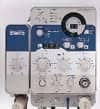A new study, published in the Journal of Allergy and Clinical Immunology, shows that patients who are more confident about the benefits of their asthma controller therapies tend to report higher levels of adherence.
The study authors tested the effect of enhancing expectations of asthma drug benefits on medication adherence in participants of the Trial of Asthma Patient Education (TAPE), a multicenter randomized clinical trial conducted by the American Lung Association focused on the placebo effect in asthma. The intervention consisted of two interactive computer-based multimedia educational presentations (enhanced versus neutral) given in conjunction with either an active drug (montelukast) or an inactive drug (placebo). The enhanced presentation was specifically designed to increase the expectation that the drug would adequately control asthma symptoms, while the neutral presentation included information on asthma care and management but without active promotion of the benefits of medication.
Participants were followed for 4 weeks, with the presentations being shown before the study drugs were dispensed, and again 2 weeks into the study. Medication adherence was measured electronically using devices fitted onto the medication bottles to record the date and time of each bottle opening.
The results showed that the enhanced presentation mode was associated with improved adherence to active drug, with the potential detrimental effects of adherence when combined with placebo. As well, when a patient expected a higher benefit from treatment, their breathing test scores improved and self-reported asthma control scores tended to be higher. There was also an accompanying trend for improvement in asthma-specific quality of life.
These results suggest that the manner in which medications are introduced to patients may not only affect their expectations about the potential benefits of the therapy, but may also impact their level of adherence and sense of improved health. The study’s authors caution, however, that care must be taken to adequately match patients’ expectations, since failure to obtain the expected benefits may negatively impact adherence.
Source: American Academy of Allergy, Asthma, & Immunology








